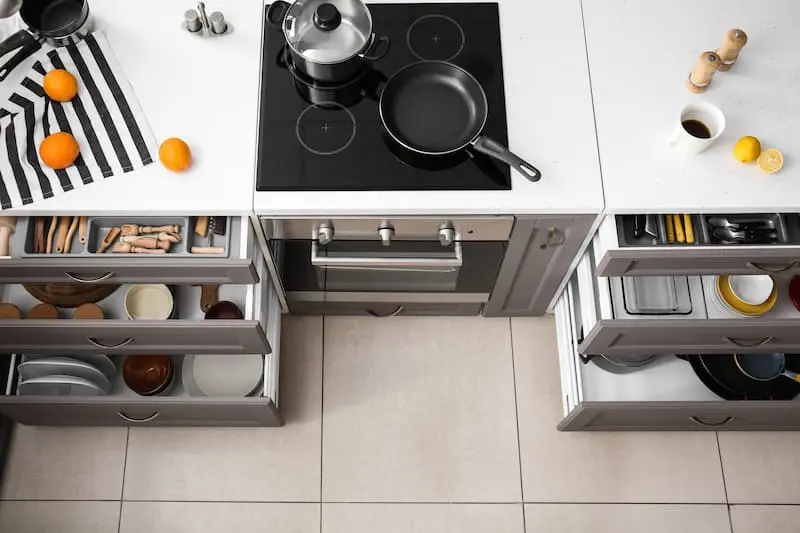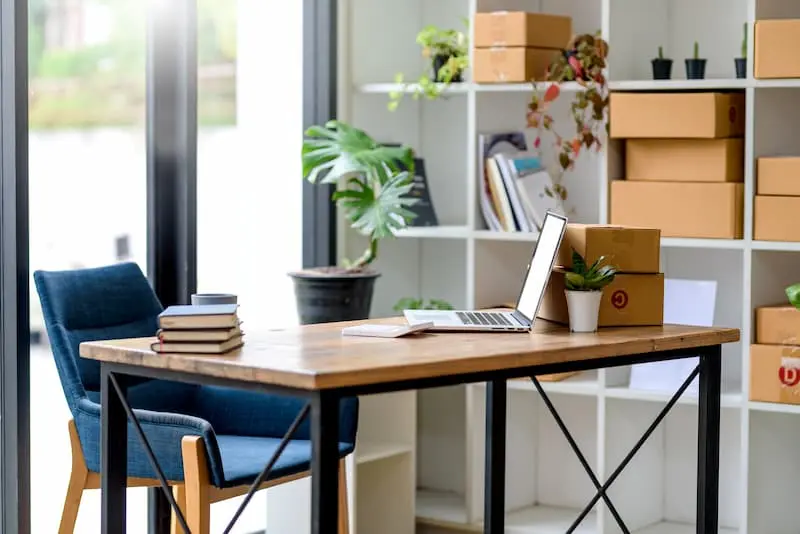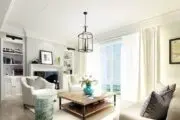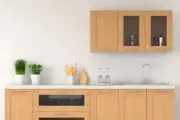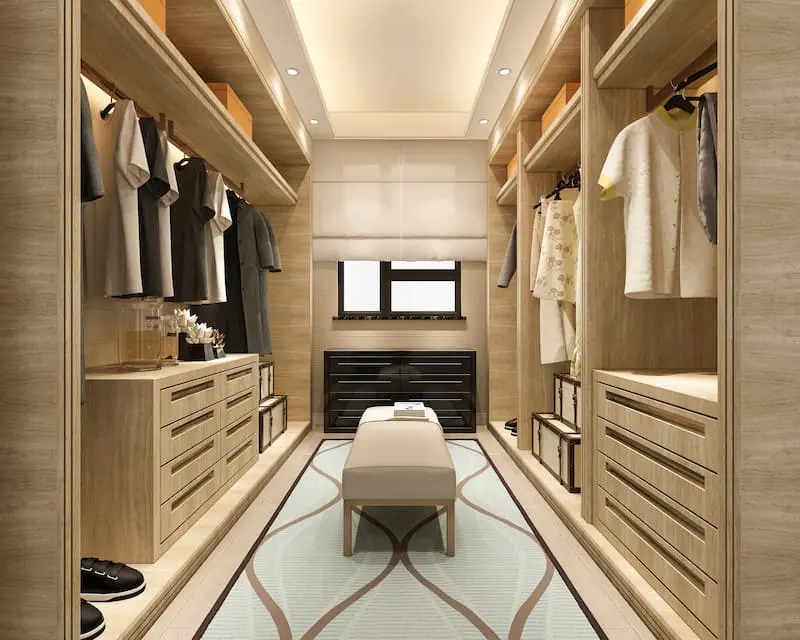
With spring just around the corner, the time is right de-clutter your home. De-cluttering isn’t just about purging unnecessary items (although that is a big component); it’s about ensuring your home has proper storage to help you maintain that spring clean feeling year-round.
With the open-concept floor plan as popular as ever, reducing clutter is even more important. While generous sightlines increase the sense of space, open concept is less forgiving for mess.
The benefits of reducing clutter
Clutter creates chaos, visually and emotionally, so reducing clutter through adopting a minimalist mindset around “stuff” and strategizing storage are both important steps in prioritizing health and wellness at home.
In addition to causing homeowners stress, clutter can impact physical health, because it is harder to clean your home thoroughly, causing germs to linger.
Having less clutter also makes décor and architectural features more prominent, emphasizing the aesthetic.
Cutting down on clutter elevates your home’s functionality, by making space available for its intended purpose.
That’s where planning proper room-by-room storage can help. You can designate specific items to be accessible, but out-of-sight-out-of-mind when you aren’t using them.
Storage tips
“Honestly, you really can never have enough storage,” says designer Kathy Kuo of Kathy Kuo Home. and homeowners should look critically at each room in their home for opportunity to create storage.
Apart from the obvious (kitchen cabinetry, bedroom and hall closets etc.), be sure to note rooms where storage is needed, but not always prioritized.
For example, “People sometimes forget that storage options in a dining room can be really useful, even if you also have storage in your kitchen,” says Kuo.
“Try a stylish buffet cabinet or hutch or bar cabinet. It’s visually pleasing to have an additional anchor piece other than the dining table and trust me, you’ll use the storage space,” she says.
Wall space is often underused, and it’s easy to create storage with hooks, shelves and racks, so take advantage of vertical space.
Be careful not to clutter open shelves or racks with loose belongings. Ideally, use baskets or other containers on the shelves to make it tidier. For example, shelving with cubbies in the mudroom or foyer keep items together and easy to access.
Proper storage plays an active role in décor, by clarifying sightlines, with sought-after architectural features, such as built-ins and shelving and with multi-purpose furniture.
“Storage furniture looks great and adds depth and visual interest to an interior design,” says Kuo.
“If you focus on investing in beautifully- made pieces that blend form and function, storage furniture becomes a fun design element,” rather than being strictly utilitarian, she says.
“Many benches and ottomans have built-in storage inside or under the seat and tiered coffee tables offer additional layers of storage and shelving without taking up additional floor space. Another fun idea is using a steamer-style trunk as a coffee table or side table,” says Kuo.
Multifunctional furniture is particularly helpful in household high-traffic areas.
Here are some room-by-room storage tips.
The kitchen
The kitchen is usually the hub for busy families, and often does double duty for entertaining. That means you need to cut down on clutter on counters, as well as have high-touch items with easy reach to simplify meal prep.
- Cabinetry with pull-out drawers offers more space than just shelving.
- In drawers, use dividers and racks for spices, cutlery, food containers, cooking utensils and pots and pans.
- Store small appliances inside your island, where they are easily accessible.
- Rather than having a knife block on the counter, install an in-counter knife drop integrating into the surface, or install a magnetic knife strip on the wall.
- Food storage is important to help with meal prep, and also to reduce food waste. Use clear bins, whether in the fridge or in the pantry, to keep ingredients tidy and visible.
- Remove cookbook clutter by digitizing recipes.
- Currently trending are floor plans that celebrate adjacent spaces to the kitchen, perfect for keeping storage and the messy part of food prep out of sight, which is really important when entertaining in an open-concept floor plan. A scullery (or messy kitchen) conceals food prep from guests, while a butler’s pantry provides out-of-the way counterspace, along with extra storage for functional items.
The laundry room
Along with the kitchen, the laundry room is one of the most function-first rooms, meaning it relies heavily on smart storage.
- Have concealed storage for laundry soaps and cleaning products.
- Include pull-out laundry bins, perfect for sorting.
- If you are short on space install a pull-down ironing board and table for sorting and folding.
- To dry clothes, install a retractable drying line on the wall, or install a pull-down drying rack.
Bedroom storage
Quality sleep is essential to mental and physical health, so create the right environment by getting rid of clutter.
- The bedroom is the perfect place to put multi-functional furniture to work, with a headboard with built-in shelving, or under-bed storage.
- Use floating shelves or a chair rail to store books and small trinkets.
- Make every inch count in your closet with storage specifically designed for different sized items: shoe racks, rails with hangers for long items and shelving for sweaters and bulky items.
- Choose a nightstand with drawers or cabinetry, rather than an open table.
The home office
Your home office is the room where you need to focus most, so storage is necessary for productivity.
- Ideally, your desk will have built- in storage. But that’s probably not enough. Invest in a filing cabinet or dresser to double as a cabinet.
- Lower cabinetry works to conceal office items, as well as printers, loose wires, cables and chargers.
- Take advantage of vertical storage by placing a hutch on your desk, or by installing hanging folders and storage for papers or to-do items.
Organize the garage
The key to garage organization is to make use of wall and ceiling space. You might even be able to park your car inside!
- Install hooks vertically to hang longer items, such as rakes, shovels and trimmers.
- Store your hose on a retractable reel, preferably on wheels.
- Shelving units with bins and buckets or wire baskets attached to the wall are helpful.
- Use overhead shelving to store seasonal items that you won’t need access to frequently, such as décor and larger sports equipment.
- Bike racks to hang cycles vertically will save floor space.
- Want a workbench in the garage for tinkering, but lack the space? Install a pull-down surface

